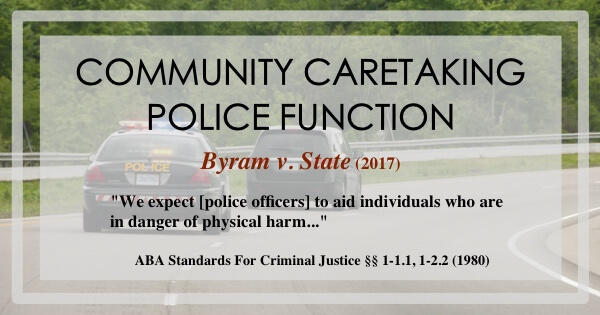Interesting opinion. In State v. Wisdom, the WA Court of Appeals Division III decided the removal and warrantless inspection of a zipped shut shaving kit bag found in the front seat of a stolen vehicle the defendant was driving was not a lawful search incident to arrest because the defendant sat handcuffed in the patrol car at the time of the seizure and search of the toiletry bag. The methamphetamine found in the zipped shut shaving kit is not lawful pursuant to the impound inventory doctrine, as unzipping the kit exceeded the lawful scope of an impound.
Defendant Heath Wisdom drove a Chevrolet pickup truck with an ATV in its back. Someone earlier reported both vehicles as stolen. Yakima County Sheriff Deputy Nate Boyer, while on patrol, passed the pickup, and Boyer’s automated license plate reader identified the pickup as stolen. Officer Boyer pulled Wisdom over and arrested him for possession of a stolen vehicle. Boyer handcuffed Wisdom, searched his body, and escorted him to the patrol vehicle. Officer Boyer found on Wisdom’s body a pipe that Wisdom admitted he used for smoking methamphetamine.
Deputy Nate Boyer advised Heath Wisdom of his Miranda rights. Officer Boyer asked if there were drugs in the truck, and Wisdom replied that methamphetamine lay on the front seat. Officer Boyer looked inside the cab of the truck and saw filters, some cleaner, and a black “shaving kit type” bag. Officer Boyer concluded that the bag contained the methamphetamine. The toiletry bag was closed, but Boyer spied money through the mesh side of the bag.
After photographing the truck, Deputy Boyer removed the bag from the vehicle, opened it, and found methamphetamine, cocaine, ecstasy, heroin, drug paraphernalia, and two thousand seven hundred dollars in cash. Heath Wisdom told Deputy Boyer that he owned the black bag. Deputy Boyer had not asked Wisdom if he owned the black bag before searching inside the bag.
Deputy Boyer never obtained a warrant for his search, nor did he request Heath Wisdom’s consent before opening the black bag. Law enforcement impounded the truck and ATV, since the legal owner could not be located.
The State of Washington charged Heath Wisdom with three counts of Possession of a Controlled Substance in violation of RCW 69.50.4013(1) (cocaine, ecstasy, and heroin) and one count of Possession of a Controlled Substance with Intent to Deliver under RCW 69.50.401(1) (methamphetamine). Wisdom moved under CrR 3.6 to suppress all evidence found in the black toiletry bag. However, the trial court denied Heath Wisdom’s motion to suppress. The WA Court of Appeals accepted review of this case.
First, the Court reasoned that the search incident to arrest exception to the warrant requirement did NOT excuse police from obtaining a search warrant before unzipping and perusing the inside of the shaving kit bag. The court’s opinion was quite lengthy in explaining the need for society to trust police, and that doing so required officers to obtain search warrants in cases like this, and that failure to do so violates a defendants rights under article I, section 7 of the WA Constitution as well as the Fourth Amendment to the U.S. Constitution.
The Court emphasized how the caselaw treats “luggage and other closed packages, bags, and containers” as unique for purposes of police searches. Washington courts recognize an individual’s privacy interest in his closed luggage, whether locked or unlocked. Indeed, the Court gave a very colorful analyses on this subject:
A person does not rummage through a woman’s purse, because ofsecrets obtained therein. A man’s shaving kit bag can be likened to a woman’s purse. The kit bag could obtain prescription drugs, condoms or other items the owner wishes shielded from the public. The bag is intended to safeguard the privacy of personal effects. Literature, medicines, and other things found inside a bag may reveal much about a person’s activities, associations and beliefs.
The Court further reasoned that Washington allows a few jealously and carefully drawn exceptions to the warrant requirement, which include exigent circumstances, searches incident to an arrest, inventory searches, plain view searches, and Terry stops. Furthermore, under Arizona v. Gant, a warrantless vehicle search incident to arrest is authorized when the arrestee would be able to obtain a weapon from the vehicle or reach evidence ofthe crime of arrest to conceal or destroy it. Here, Heath Wisdom sat handcuffed in the patrol car at the time of the seizure and search of the toiletry bag. He lacked access to the bag.
Furthermore, under State v. Snapp, the Court reasoned the WA Constitution disapproves expansive application of the search-incident-to arrest exception to the period of time after the arrestee is secured and attendant risks to officers have passed. When a search can be delayed without running afoul of concerns for officer safety or to preserve evidence of the crime of arrest from concealment or destruction by the arrestee, and does not fall within another applicable exception, the warrant must be obtained. The police officer can prevent destruction of evidence by holding the bag as a sealed unit until obtaining a warrant.
Finally, the Court ruled that the police officer’s inventorying of the pickup’s contents did NOT excuse the need to obtain a search warrant. Inventory searches, unlike other searches, are not conducted to discover evidence of crime. Although a routine inventory search does not require a warrant, a police department policy should not, however, justify an unconstitutional search. The permitted extent of an inventory search pursuant to police department policy must be restricted to effectuating the purposes that justify the exception warrant clause.
In conclusion, the Court of Appeals held the warrantless search inside of Mr. Wisdom’s black bag was not justified by either a search incident to arrest or an inventory search. The court reversed the trial court’s denial of Mr. Wisdom’s motion to suppress evidence, reversed his four convictions, and dismissed all charges filed against him.
Good opinion.
Please contact my office if you, a friend or family member are charged with a crime. Hiring an effective and competent defense attorney is the first and best step toward justice.


















